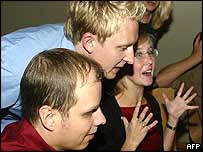
The effects of Sweden's no vote will be felt throughout Europe
|
Sweden has voted by a clear majority to reject the euro in a referendum overshadowed by the killing of Foreign Minister Anna Lindh.
The final result shows 56% voting against the euro, with only 42% in favour, on a high turnout of 81%.
The Swedish Prime Minister, Goran Persson - who had campaigned for a Yes vote - said the result was a clear victory for opponents of Swedish Euro-membership.
The BBC's James Coomarasamy says one of Europe's most dynamic economies will now remain outside the euro zone for the foreseeable future.
He adds that this will ensure that the EU's flagship unifying economic project will continue to be a source of division.
Opponents of the euro in Britain and Denmark, the other two EU countries outside the euro zone, have already welcomed the result.
The outcome confounded some predictions that the Yes campaign would benefit from sympathy votes following Lindh's murder last week.
Lindh was the main face of the Yes campaign, and most opinion polls after her stabbing in a Stockholm department store showed support for the euro rising.
Swedish voters were the first to hold a referendum on the euro since the single currency went into circulation in 2002 in 12 of 15 EU countries.
'Worse than expected'
In a statement, the European Commission said it had noted the result of the Swedish vote but still hoped that Sweden would keep the euro project alive.
It added that the world's second currency was still a young one, and that its benefits were not yet clear to all parts of the European Union.
European Commission President Romano Prodi went further, saying the vote would mean Sweden losing influence in EU decision-making.
"I admit that the result is worse than I expected," he told Swedish television.
 |
EURO CLUB
IN: Austria, Belgium, Finland, France, Germany, Greece, Ireland, Italy, Luxembourg, The Netherlands, Portugal, Spain
OUT: Denmark, Sweden, UK
|
Danish Prime Minister Anders Fogh Rasmussen, who aims to lead his country into the euro zone, said the Swedish result had "no bearing on our attitude towards the single currency".
German Chancellor Gerhard Schroeder deplored the result, but said "the door was not closed and that the possibility of a later Swedish euro entry remained".
In Britain, opponents of joining the single currency said Swedish voters had recognised serious economic problems inside the euro zone and feared losing control of their economy.
A member of the Britain's opposition Conservatives, Michael Ancram, said the Swedish decision reinforced his party's view that joining the euro was not in Britain's economic or political interest.
The Swedish outcome "gives the lie to those who've been saying for years, 'oh, joining the euro is inevitable, and only the British are creating any problems about it'."
Some Swedish business leaders say they will demand compensation from the government for the income lost as a result of staying outside the euro zone.
The Swedish krona fell slightly against the euro on foreign exchange markets after the vote but traders said any movement would be small because a No vote had been expected.
Mr Persson has said another euro referendum is now not likely to be held for another 10 years.

